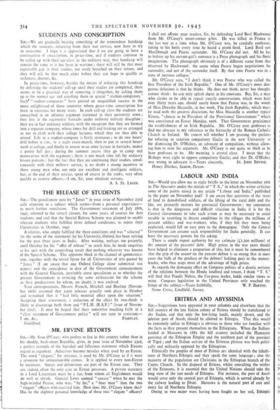LABOUR AND INDIA
SIR,—Would you allow me to reply briefly to the letter on November t6th in The Spectator under the initials of" T. S.," in which the writer criticises some of the points raised in my article "Labour and India," published in the paper on November and?' I am aware that questions of the grant of land to demobilised soldiers, of the lifting of the rural dept and the like, are primarily matters for provincial Governments ; my contention is that in the dangerous and difficult situation in India it is for the Central Government to take such action as may be necessary to avoid trouble in resettling in decent conditions in the villages the millions of peasant soldiers and war-workers, who, if they felt they were being neglected, would fall an easy prey to the demagogue. • Only the Central Government can assume such responsibility for India generally. It can have the necessary powers for the asking.
There is ample expert authority for my cstimate (£1,3oo millions) of the amount of the peasants' debt. High prices in the war years should have helped to eliminate a proportion of this, but it must be remembered that the grip of the usurer on the peasant debtor is so strong that in most cases the bulk of the produce of the debtors' holding goes to the money- lender, who thus reaps most of the advantage of high prices.
As regards the damaging effect on Congress politics of a drastic revision of the relations between the Hindu landlord and tenant, I think "T. S." will find that Pundit Nehru, the Congress leader, holds similar views to mine. Congress legislation in the United Provinces only touched the
fringe of the subject.—Yours faithfully, W. P. BARTON. Stone Cross, Lindfield, Sussex.






























 Previous page
Previous page